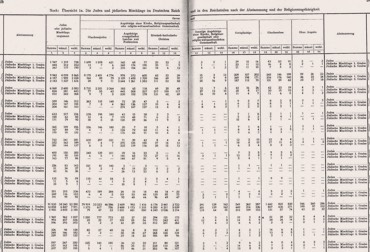
In May 1939 a census (German: Volkszählung) was conducted in Germany (including annexed Austria and the so-called “Sudetenland” of the occupied Czech Republic) that required the head of each household to fill out a supplementary card, or Ergänzungskarte, which mandated marking the Jewish background of each of the resident’s four grandparents. By 1942, the cards of households with one or more residents with a Jewish grandparent marked on their card, the so-called “Minority Census,” were collected and sent to the Reich Genealogy Office (Reichssippenamt), then located in a building seized from the Berlin Jewish Community, where the cards most likely survived through the end of the war.
By the 1980s, the cards were in the custody of the State Archives of the communist government in East Germany, and in the 1990s the cards were in the custody of the German Federal Archives. It was discovered that the cards are about 87% complete, lacking only for Thüringen, the Rhine Province, the districts of Erfurt and Minden, and several districts of Bavaria. Many of the districts included are areas that are now part of Poland (such as Silesia, Pomerania, and east Brandenburg) and Russia (East Prussia / Kaliningrad).
Tracing the Past does not have access to the Census cards or scanned images of the Census cards. Microfilm copies of the supplementary cards of the German “Minority Census” of 1939 are publicly available in the United States at the Family History Library of Salt Lake City, Utah; the Leo Baeck Institute in New York and the United States Holocaust Memorial Museum in Washington, DC; In Germany, a computerized version is available on an application basis at the Federal Archives in Berlin-Lichterfelde, and a copy of the census is in Israel at Yad Vashem in Jerusalem.
The database contains the names of all of the people who lived in the household where one or more people in the household had a minimum of one Jewish grandparent. This means that there are also a number of non-Jewish individuals in the database, making it excellent source material for finding more biographical information on non-Jewish spouses.
Tracing the Past is honored to have the opportunity to share this source of historical Holocaust-related information online via the Mapping the Lives Project. Around two-thirds of the circa 170,000 Holocaust victims from Germany are now searchable for the first time by residential street address.
